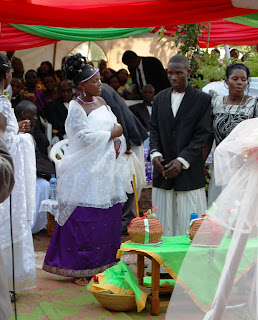Last week I went to my Ugandan friend Lucy's house to pick up some sewing she had done for us. As we visited, I asked her how she had come to live in Kampala from her village about four hours away. Here is her story, the best I can remember it:
"We had three children at the time. My husband decided to go to Kampala to look for work. When he got to the city, he began to look around for a job. He didn't find work the first day, but he met a man from our tribe who said he could stay with him. After three days he still hadn't found work, and the man said he couldn't stay any longer. My husband slept in a tree that night, and continued to sleep there for a week. Then he found another man from our tribe who said he could help him paint. My husband began to sleep in the building where he was painting. Then he was invited to share the room of someone he was working with so he didn't have to sleep in the building any more.
A year had passed and I was pregnant with our fourth child. I hadn't heard from my husband for a long time and life was hard for me in the village. My husband said I should send the children to him. I put them on a boda boda (motorcycle) and told the man where in the city my husband would be. My husband was waiting there for the children when they arrived. A couple months later I gave birth to our child, a son. Not long after that I came to the city too.
We were all living in one room in the same man's house where my husband had been staying. One afternoon our baby became sick. He was very hot and wouldn't stop crying. My husband was at work and I didn't know what to do. I took the baby to a clinic where they gave him panadol (an analgesic) and chloraquine (the standard treatment for malaria. Almost any illness is routinely diagnosed and treated as malaria). The next night the baby was still sick and his eyes began to roll back in his head. We decided to go to the hospital and began to walk there. When we got there they tried to save my baby but he died. We went to the village to bury him.
When we returned to Kampala, we had been unable to pay our rent for three months. The landlord threatened to throw us out of our room. Shortly after, he came at four in the morning and told us we must leave. He locked the door behind us. It was raining and we had nowhere to go. The people who lived next to us came out and told us we could move in with them. They were a family living in one room, but they put a piece of fabric down the middle as a divider and we had one side and they had the other. There was little room to sleep, but my husband slept under the bed and the children slept together. So you can see it was a hard time for us. I don't like to think about it."
She told me this in a quiet, matter-of-fact way. It gave me a new perspective on her current home. When I first went there I was struck, as I generally am in Ugandan homes, with how little she had. But when I see where she has come from, I could see that it was an improvement.
By the way, at the end of our conversation she called her daughter, Joyce, into the room. Joyce stood shyly in front of me as Lucy asked me if I could find a sponsor to pay her school fees. Joyce is fifteen. Lucy said in her own family, girls never went to school beyond about sixth grade, but she wanted Joyce to be able continue her education. I felt for her, but was torn by the same feelings I have explained earlier in my post "The Lucy dilemma." How did I know the money someone sent would actually be used for Joyce's education? Why help Joyce and not someone else? If we helped Joyce, who would we be asked to help next in the unending quest for school fees? I decided to take a chance and talk frankly to Lucy and her son, Dennis, who was also in the room (he needs fees, too, by the way, to go to university) about my skepticism. They listened thoughtfully and said they understood, but that they were honest people. They offered to send receipts for donations and said the money could be deposited directly into the school's bank account. And so the needs go on...
On a last note, Paul got word today that the disabled man's trike is ready. Farouk is planning to go tomorrow and pick it up and take it to Rev. David. By next week, our friend whose name we don't know could have his new wheels.
 These pictures don't have anything to do with the post, they are just miscellaneous street scenes from our neighborhood. Fresh chicken, anyone?
These pictures don't have anything to do with the post, they are just miscellaneous street scenes from our neighborhood. Fresh chicken, anyone?




































